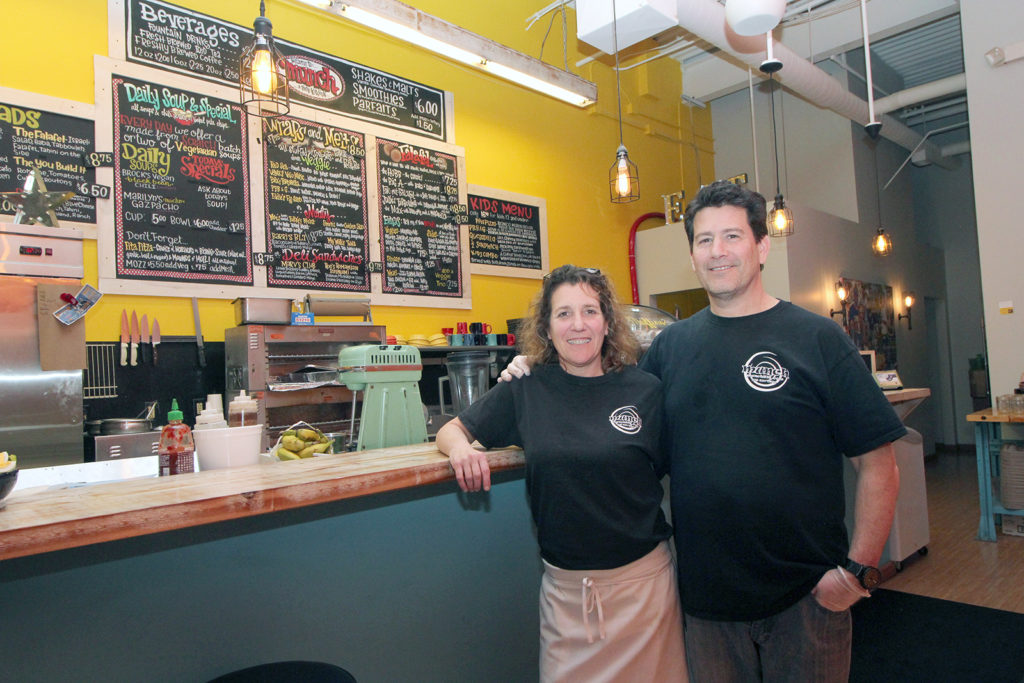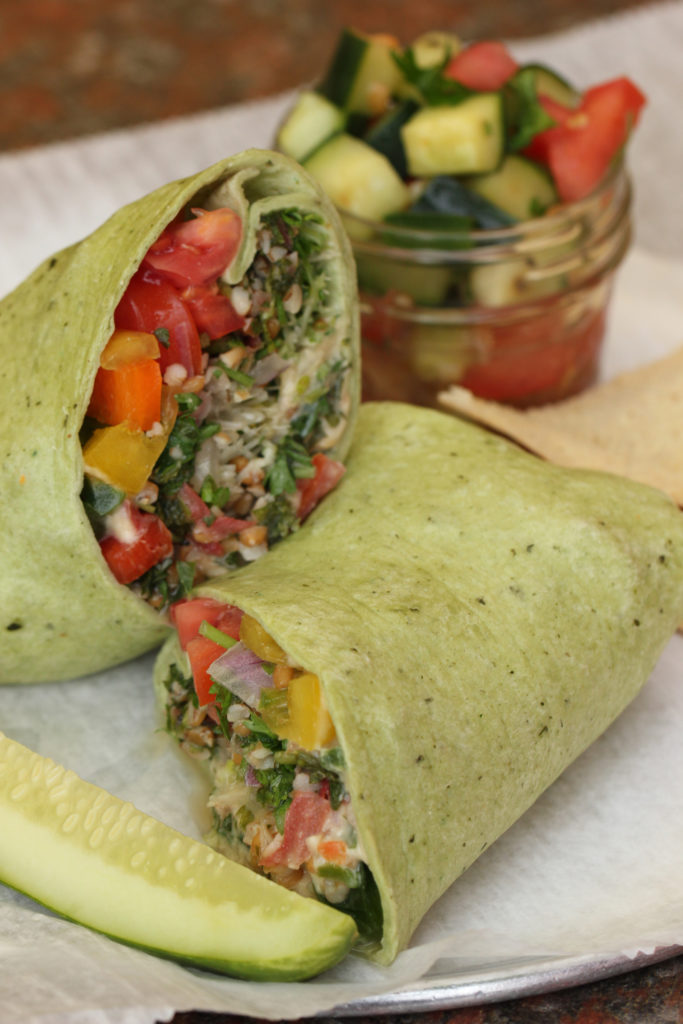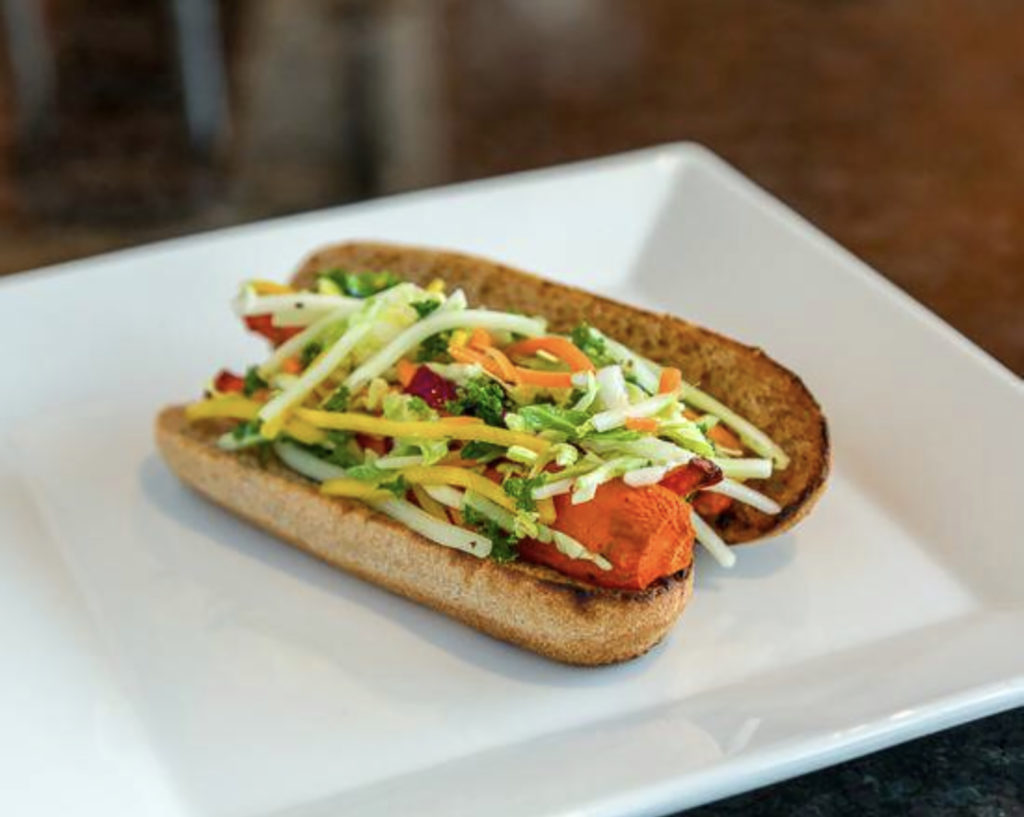HEALTHY SHIFT
By Skylar Dubelko
Millennials became the largest living generation this year, and now with more spending power than Baby Boomers, many are choosing to buy differently than their parents.
In regard to food, studies have shown Millennials are more likely to eat up their savings by dining out more frequently. However, they’re some of the healthiest eaters of any generation.
In 2016, the Organic Trade Association reported 52% of Millennials were stocking their shopping carts with organic items on a regular basis and eating more vegetables than their older counterparts.
And the thought Millennials are putting into their eating habits has entrepreneurs taking note.
Scott and Jamie Hersch were ahead of the curve, opening Shticks, a vegetarian kitchen in 1997. At the time, they were located in Case Western Reserve University’s Hillel building and their menu consisted of five sandwiches and a falafel bar.
Over the years, their name, menu and location has changed. The couple’s restaurant moved to Solon in 2015 and now goes by the moniker Munch, A Simple Kitchen.

Noting the restaurant has never been completely vegetarian, Scott Hersch says “flexitarian” would better describe its menu. It also takes inspiration from Israeli favorites.
“We sell a lot of bacon for a vegetarian place,” Hersch says. “Because in Cleveland, it’s a meat and potatoes town.”
However, Hersch developed an attitude about how food “should be” early on, he says. “We try to make all the food good; I’m not trying to make the vegetarian food better than the other. There’s still that strong desire, I guess, for meat.”
While there are many different notions about what a healthy diet is – and what is healthy for one person may not be for someone else – most would incorporate more plant-based, unprocessed food. Put succinctly by food writer Michael Pollan: “Eat food. Not too much. Mostly plants.”
And as growing environmental problems are linked to mass production of meat and dairy, and for an array of other reasons, more and more people – and companies – are working to make plant-based foods the primary focus of an American meal. For example, look at the rise of the Impossible Burger, a plant-based burger formulated to be comparable in taste to beef.

In Hersch’s experience, many people who alter their diet to be strictly vegetarian or vegan end up looking for substitute foods constantly. Veggie burgers, for example, don’t really trend toward health, Hersch says, “They really just trend towards desire.”
Thus, the goal at Munch – as well as other Northeast Ohio eateries taking hold of the health food shift – is to take whole foods and real plant foods and make them taste delicious.
“So people don’t feel like they’re missing their burger or their steak or whatever they have,” Hersch says. “And if nothing else, (it’s) an alternative to … eating meat at every meal.”
Making plant-based better
Asked about nutrition, Hersch matter-of-factly says, “I think we’ve been fed a bill of goods.”
Describing America as “crazy about protein,” Hersch explains, “People here add chicken to falafel. In reality, unless you’re malnourished, you’re never protein deficient.”
“You get enough protein from plants,” Hersch adds, “and the biggest beasts on the planet are vegetarians – the strongest and biggest elephants, gorillas, all vegetarians.”
Having been in the restaurant business for over 20 years, Hersch has paid attention to trends and believes Cleveland is moving in the right direction.
“There’s more places opening and there’s more vegan and vegetarian options on almost all menus than there used to be,” Hersch says. In his opinion, however, it still hasn’t gone far enough.
Julie Hutchison, who opened vegan and vegetarian kitchen The Root Cafe in Lakewood in 2009, has a similar mindset. While more people are trying to embrace healthy eating trends, Hutchison believes there are “a lot of falsehoods” when it comes to how Americans are taught about nutrition.
“There are also concerns because of the fact that we don’t get a lot of sunshine in the winter and we don’t get outside as much,” Hutchison says of Clevelanders. “So we are missing some Vitamin D and things like that, but there’s other plant-based ways and healthy ways that you can get that rather than eating meat.”

Hutchison tries to be mindful of how The Root Cafe sources its food. She says an important aspect of eating well is eating simply prepared foods that are close to the food source. Noting the cafe doesn’t buy any packaged or premade items, Hutchison says it tries to make everything from scratch, with the exception of bread, which is bought from a local bakery that also uses local ingredients.
“There are a lot of people who want to support eating healthy in that way. So they’re eating a lot of local, fresh vegetables and fruits,” Hutchison says.
Food allergies are another motivation for healthy eating.
“A lot of people are realizing that certain things, for whatever reason, are causing problems,” she says. Listing gluten, corn, soy and dairy as ingredients that can be problematic, Hutchison notes The Root Cafe clearly labels each product with an ingredient list.
Like Hersch, Hutchison has also noticed more healthy eating spots opening in and around Cleveland. She has developed a particular affinity for cold pressed juice bars that also offer a food menu.
“I see that happening a lot and I like that a lot,” Hutchison says. “I’m a big fan of Beet Jar juice bar on West 29th Street. You can go there and get tons of food and have a full meal. It’s all super healthy and I just know that whatever is prepared there is going to meet my standards.”
Moving past processed foods
Hutchison says in keeping with the health food trend, ideally people will want to eat things close to their source.
“So getting used to eating things that aren’t processed, and that’s going to be something hard for people to unlearn, I guess – or to relearn to enjoy the flavors of simple, healthy foods,” Hutchison explains.
People are used to eating flavored food products, Hutchison says, and even in the grocery store, almost everything that is in a package has added flavor.
“Whether it’s juice, a frozen meal, whatever it is, they put flavor in it,” Hutchison says. “I think that’s going to be hard to overcome, but it would be really nice to have people be used to eating foods that are simply prepared without added flavors. And also shopping for themselves like that as well, and eating more simple in the home rather than buying premade snacks.”
On a similar mission, Elliott Endsley opened Nature’s Oasis in Lakewood in 2016 with a vision to provide healthy, all-natural foods to the local community and travelers alike. He recently expanded with another location at the Van Aken District in Shaker Heights. Nature’s Oasis offers grocery items and prepared food, and Endsley believes current food trends are moving away from processed food.
“It’s been that way for years, but I think recently, at least in the markets that we’re in, there’s a lot more focus on moving away from meat, going towards plant-based diets,” Endsley says.
As a community, he says Lakewood embraced the concept early on, and positive customer feedback encouraged him to open the second location.
“The Van Aken project seemed pretty exciting since it’s focused on a lot of Cleveland-based businesses,” Endsley says. “It seemed like a perfect fit for us to expand to the East Side to get a little better access to the customers that we don’t have over here.”

Nature’s Oasis’ Lakewood location is more focused on healthy, prepared food, Endsley says, whereas the Shaker Heights location offers a grocery section that is more than three times the size of Lakewood’s.
“Because that community likes to cook at home a lot more,” Endsley notes, referring to the Shaker Heights area. Much of the prepared food sold at Nature’s Oasis is made using items from its grocery.
“We follow the same ingredient standards that we do in our grocery, so no added colors or artificial flavors or high fructose corn syrups or any artificial preservatives,” Endsley says. “We have a whole list of ingredients that we do not allow in our store (and) our cafe.”
Like Hutchison, Endsley focuses on sourcing local products and ingredients – Nature’s Oasis has partnered with over 150 companies in Northeast Ohio and over 100 more Ohio-based businesses.
“We’ve been the launching point for … (several) different companies. We were the first (store) to carry their products on the shelves,” Endsley says. “And so, for me being an entrepreneur, that’s super exciting because that’s a big deal for someone to get from a farmer’s market style onto a retail shelf.”
Endsley, and Hersch and Hutchison, seem to agree the health-minded approach will continue to take root locally, especially as more restaurants and markets offer more plant-based and unprocessed items.
“As the big picture, what I see is a lot more either restaurants or markets that are solely focused on health-based items or non-GMOs and all natural ingredients. There are a lot of places popping up,” Endsley says. “But not only that, it seems like almost every restaurant now offers some version of a vegan or vegetarian dish, whereas before, you’d have one or two, and now it’s a little more prominent on everyone’s menu.”
